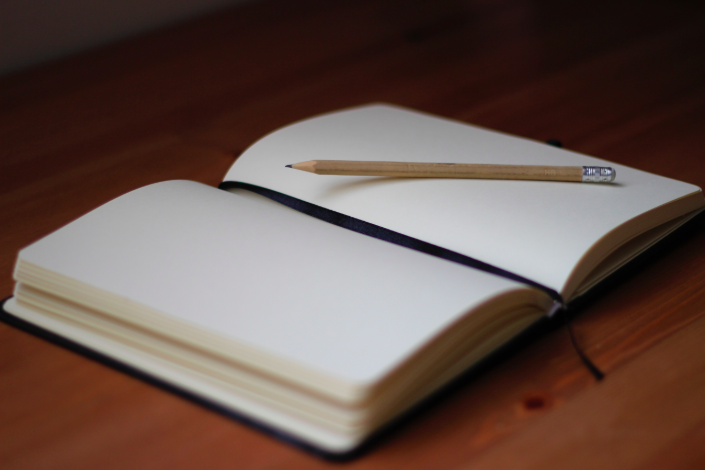
- BLOG
Dear Diary...
Kamwell's Emma James explores: journalling
It all started when I read The Secret Diary of Adrian Mole at the ripe old age of 12: I became fascinated with the idea of committing my thoughts and feelings to paper and have done so ever since, albeit sporadically. My journaling activity tends to peak either when life is especially good, or when I’m finding things tough. In other words, I use journaling as an outlet for my emotions and there is little rhyme or reason to what and when I write.
I recently came across an article about the benefits of purposeful, organised journaling. It piqued my interest so I decided to do some further investigating. A cursory google yielded many articles suggesting that the simple act of focusing one’s thoughts and writing them down at the start and end of each day has far-reaching benefits for wellbeing. I was intrigued, but wondered a) whether I would be able to stick to daily practice and b) whether the purported benefits would indeed materialise. So, with some scepticism, I decided to give it a go: I kept a daily journal for a whole month.
Based on the research I’d done, I decided on the following framework:
A.M: Intention and gratitude:
- list three things to be grateful for
- set three intentions for the day, i.e. “today I will be productive”, “today I will respond calmly to whatever comes my way” etc.
P.M: Reflection
- list three things that went well in the day that passed.
I have used journaling app Day One for years (and love it) but decided that hand-writing my entries felt like a more committed and concrete approach (in other words: I am an incurable stationary addict and wanted an excuse to buy a new notebook). Armed with my notebook and pen (ok, I admit it, I also bought a new pen), I got to work. I have two young children so finding time for my morning entry took great discipline at first. But I soon found my schedule ‘sweet spot’ and then stuck to it religiously. My advice: keep your entries short, they shouldn’t take more than 2 minutes. I found that the less I thought about what I wanted to write, the more concise and honest I was. And set a deadline for completion: mine was 9am.
For the same child-related reasons, it was often a challenge to write in the evenings. The pull of sleep from 9pm onwards is incredibly strong but, again, discipline got me through and it soon became a habit I didn’t feel I could skip, akin to brushing my teeth. My advice: make sure your notebook is next to your bed before you get into it – proximity is key!
One month on, these are my reflections:
- Listing things I am grateful for made me start each day with a sense of perspective. It’s easy to fall out of bed in the mornings and sleep walk into the day. Taking a moment to be grateful snapped me out of this and forced me to ‘see the bigger picture’ for a moment. My son may have used Weetabix to glue my laptop together and emptied the clean washing onto our muddy lawn (all in the space of 4.5 minutes), but he is healthy and happy, and taking the time to focus on this seemed to keep stress at bay.
- Setting intentions for the day felt fairly futile at first but the more specific I got the more they started to change the course of my day. For example, if I’d set the intention “to have fun with my children” this popped into my head when I felt tempted to bring out the iPad so I could get some chores done. And I don’t doubt that the bigger, more long-term intentions I listed will in some way shape my future. I can’t put this better than Deepak Chopra, who says: “An intention is a directed impulse of consciousness that contains the seed form of that which you aim to create. Only when you release your intentions into the fertile depths of your consciousness can they grow and flourish”.
- Documenting three things that went well in the day made me realise how often I get into bed feeling frazzled and, frankly, a bit grumpy. This process was an effective way of undoing unnecessary tension and negativity and it gave me a greater sense of calm and appreciation. On challenging days, I’d open my notebook feeling like I wouldn’t have anything positive to write, but I always did, giving me that ‘oh it wasn’t so bad after all’ feeling. I can’t say this for sure but I get the sense that I’ve been able to fall asleep faster and, dare I say it, sleep a bit better.
- Reading back through a month of entries has been surprisingly interesting and I’d go as far as saying I’ve learned something about myself. I can see patterns in my focus and priorities and these have helped me organise my time in a way that I find fulfilling. For example, my intentions often centred around productivity (at work – always! - but also in my home life) and when I reflected on the day that passed such activity seemed to have given me the greatest sense of satisfaction. I have since made sure that I set aside time every day to work through my list of ‘life to-dos’ because I’ve realised it is instrumental to my wellbeing.
So, there we have it: a month of journaling! Would I recommend it? Yes. Will I keep up my own practice? Definitely.
Want to find out more? Below are some articles I found interesting:
http://www.huffingtonpost.com/thai-nguyen/benefits-of-journaling-_b_6648884.html
There are some brilliant journals on the market that have a pre-designed structure to them:
